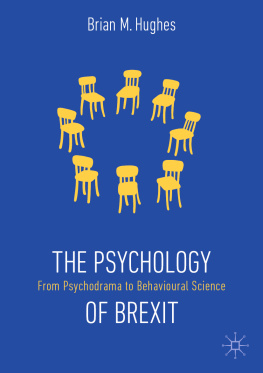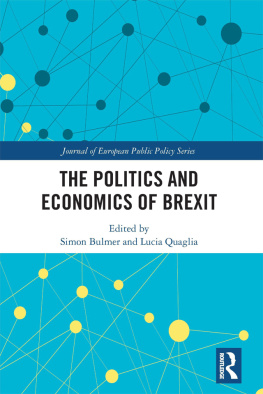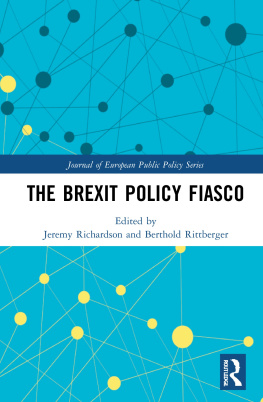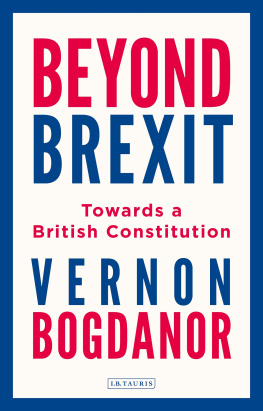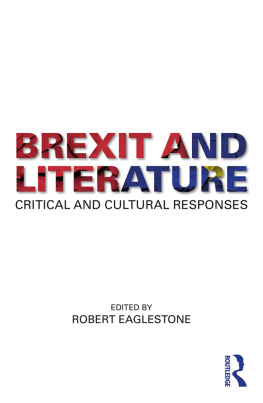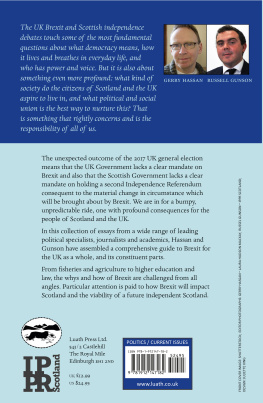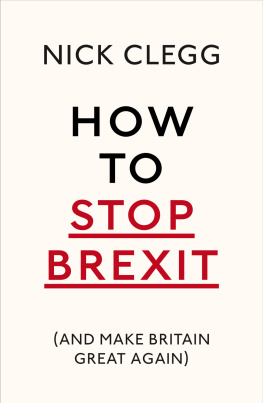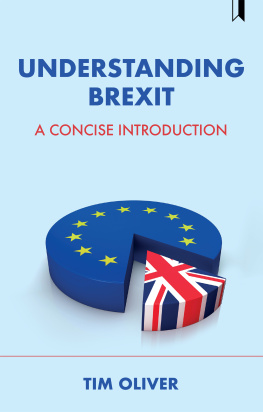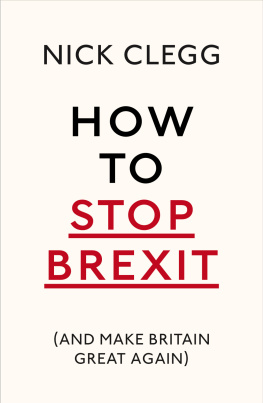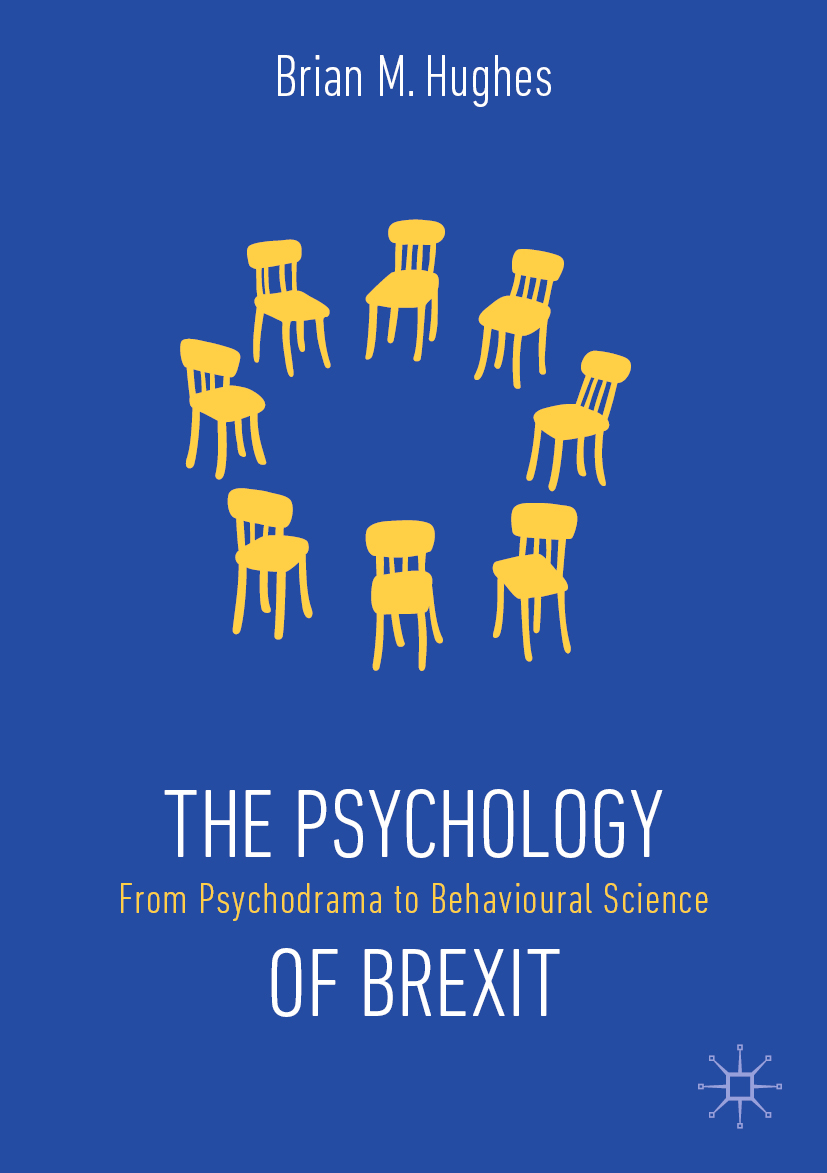Brian M. Hughes
The Psychology of Brexit
From Psychodrama to Behavioural Science
Brian M. Hughes
School of Psychology, National University of Ireland, Galway, Galway, Ireland
ISBN 978-3-030-29363-5 e-ISBN 978-3-030-29364-2
https://doi.org/10.1007/978-3-030-29364-2
The Editor(s) (if applicable) and The Author(s), under exclusive license to Springer Nature Switzerland AG 2019
This work is subject to copyright. All rights are solely and exclusively licensed by the Publisher, whether the whole or part of the material is concerned, specifically the rights of translation, reprinting, reuse of illustrations, recitation, broadcasting, reproduction on microfilms or in any other physical way, and transmission or information storage and retrieval, electronic adaptation, computer software, or by similar or dissimilar methodology now known or hereafter developed.
The use of general descriptive names, registered names, trademarks, service marks, etc. in this publication does not imply, even in the absence of a specific statement, that such names are exempt from the relevant protective laws and regulations and therefore free for general use.
The publisher, the authors and the editors are safe to assume that the advice and information in this book are believed to be true and accurate at the date of publication. Neither the publisher nor the authors or the editors give a warranty, expressed or implied, with respect to the material contained herein or for any errors or omissions that may have been made. The publisher remains neutral with regard to jurisdictional claims in published maps and institutional affiliations.
Cover credit: mspoint/shutterstock.com
This Palgrave Macmillan imprint is published by the registered company Springer Nature Switzerland AG
The registered company address is: Gewerbestrasse 11, 6330 Cham, Switzerland
As a psychologist and former president of the UKs professional body for psychology, I have seen Brexit concerns in both the UK and Europe at first hand. But depth of psychological analysis has up to now been in short supply. Brian Hughes fills this gap with a penetrating analysis of the impact on citizens and communities, written with energy and style. One that I think will earn an enduring place on the Brexit bookshelf.
Nicola Gale, Department of Psychology, City, University of London and Former President of the British Psychological Society
This book is an articulate and insightful enquiry into the psychology of Brexit. Brian Hughes draws upon theories from cognitive psychology, social psychology and individual differences to explain what compelled a majority of British people who turned out at the ballot box to vote to leave the European Union, and the psychological consequences of this collective decision. Hughess accessible and absorbing style makes this a must-read for anyone interested in human behaviour and decision-making.
Michael Smith, Associate Professor of Psychology, Northumbria University, UK
This book is a must-read for politicians, academics, and teachers, as well as the layperson. In this excellent and clearly written volume, Hughes has illustrated the integral connection between political decisions and psychological well-being and as such this book is in the vanguard of the area. Politicians need to be cognizant that their decisions impact not only the political and economic future of their countries, but also they can seriously impact the mental health of their citizens.
Esther Greenglass, Professor of Psychology, York University, Toronto, Canada
Political circumstances are inherent companions of human experience, bringing gains and losses, rewards and costs, regardless of whether or not they are directly or indirectly influenced and/or experienced. Its no surprise then, particularly to social scientists, to discover how much politics affect our psychological beings. Yet the psychological dynamics that govern political processes and outcomes may be less obvious, particularly to politicians. Hughess timely, insightful and brave analysis of the psychology of politics of Brexit is a lesson for all.
Krys Kaniasty, Distinguished Professor of Psychology, Indiana University of Pennsylvania, USA, and Institute of Psychology, Polish Academy of Sciences, Poland
To my parents,
Mary and Jarlath
Acknowledgements
I would like to thank everyone at Palgrave for their work on this book, with particular thanks to Beth Farrow for her support and guidance. I am also grateful to Jo ONeill.
I am extremely thankful to a number of colleagues and contacts who have provided their advice and feedback. I am fortunate to have been able to call on specialists in many different areas (nonetheless, all errors of fact or judgement are of course my own). Special thanks to Aidan Kane, Donncha OConnell, Marie-Louise Coolahan, Marguerite Hughes, and Siobhn Howard for reading drafts of various sections, and for their expert feedback. I am also grateful to a number of others for sharing their ideas, thoughts, and Brexit perspectives, including Krys Kaniasty, Praic Silleabhin, Chris Snowdon, Esther Greenglass, and John Bogue. Some of the thoughts on these pages I rehearsed at a public lecture for the Psychological Society of Ireland, and I am thankful to all at PSI for arranging this, including Terri Morrissey and Lisa Stafford.
As always, I want to pay personal tribute to the usual gang for their constant support and patience, to Annie and Louis, and, especially, Marguerite.
Brian M. Hughes
Also by Brian M. Hughes
Conceptual and Historical Issues in Psychology (2012, Prentice-Hall)
Rethinking Psychology: Good Science, Bad Science, Pseudoscience (2016, Palgrave)
Psychology in Crisis (2018, Palgrave)
Contents
1. Brexit as Psychodrama
THE EMPIRE STRIKES BACK shouted the headline, its huge white letters consuming almost the entire front page. It was one of those days when the news needed to be announced in block capitals. In the background was a barely visible greyed-out Union Flag, worn away, no doubt, by winds of destruction, while below, a cut-out of Prime Minister David Cameron gazed offstage, his pained face signalling defeat to the world.
With clichd but nonetheless vivid visual cues, this tabloid headline proclaimed a unique historical juncture, a moment in time that few readers would ever truly forget (Miranda, 2016).
It was the day after the Brexit referendum. Against every expectation, the people had voted Leave. Get us out of here, they said. Britain, and perhaps the world, would never be the same again.
But while it was certainly eye-catching and suitably dramatic, the headline was a little curious just the same. Something did not quite add up.
Was this an allusion to the United Kingdoms self-styled standing as an imperial power, whose global relevance owes more to historical and cultural nostalgia than to actual territorial dominion?

